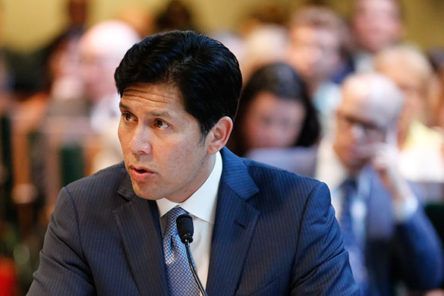IRS could easily block state plan to increase tax deductions
by Chris Reed | January 24, 2018 10:02 am
 Democratic state lawmakers’ interest in pursuing an unprecedented plan to minimize the hit that California’s high-income residents face because of the federal tax overhaul’s $10,000 cap on deductibility of state and local taxes may be losing momentum – undermined by strong warnings from Treasury Secretary Steven Mnuchin, who oversees the Internal Revenue Service, and by a new analysis that says the IRS could easily squelch the maneuver.
Democratic state lawmakers’ interest in pursuing an unprecedented plan to minimize the hit that California’s high-income residents face because of the federal tax overhaul’s $10,000 cap on deductibility of state and local taxes may be losing momentum – undermined by strong warnings from Treasury Secretary Steven Mnuchin, who oversees the Internal Revenue Service, and by a new analysis that says the IRS could easily squelch the maneuver.
Senate President Pro Tem Kevin de Leon, D-Los Angeles, pictured, introduced Senate Bill 227 early this month. It would allow the estimated 6 million Californians who itemize their federal income taxes to effectively continue to write off state and local tax deductions in excess of $10,000 by allowing them to pay their state taxes to a state charitable foundation[1], the California Excellence Fund.
Tax experts note that states have long allowed[2] tax deductions for charitable donations and say de Leon’s ploy is protected by the fact that tax laws are traditionally subject to stricter interpretation than most federal laws because of concerns that a rogue IRS could target individuals or companies it didn’t like.
Democratic lawmakers embraced de Leon’s proposal, saying the move would allow the 6 million state taxpayers who itemize deductions to save an average of more than $8,000[3] a year.
Washington Post: California shows how to take on Trump
But after Washington Post coverage [4]of the legislation asserted it could create a “national boilerplate for skirting Trump tax changes,” the Trump administration took notice of what California was up to.
Politico reported [5]that Mnuchin called the proposal in California and similar proposals in other high-tax states “ridiculous.” Mnuchin emphasized that the IRS was allowed to decide what qualifies as an IRS-recognized charity.
“Let me just say again from a Treasury standpoint and IRS, I don’t want to speculate on what people will do, but I think it’s one of the more ridiculous comments to think you can take a real estate tax that you are required to make and dress that up as a charitable contribution,” Mnuchin told reporters at the White House. He described the ploy as an obvious attempt by states “to evade the law.”
Mnuchin’s comments were backed up in a report[6] by the Washington, D.C.-based Tax Foundation.
“This proposal, while interesting, is fairly obviously in violation of existing law and jurisprudence,” wrote veteran tax analyst Jared Walczak. “Just because the IRS has not consistently cracked down on some minor efforts here and there does not mean it would turn a blind eye to a concerted effort to contravene the tax code by providing a contribution in lieu of taxes program.”
Walczak warned state lawmakers that when it comes to de Leon’s Senate Bill 227[7], the IRS could readily thwart it under precedents that allow it to block deductions for charitable donations if the agency concluded there was no “charitable intent” to the donations.
Given that de Leon and other backers of the bill have openly described it as being designed to reduce Californians’ payments to the U.S. Treasury, lawyers defending the bill if it became law and was rejected by the IRS would face a difficult task: making a plausible case that a “charitable donation” that was undertaken with the goal of reducing an individual’s or family’s tax obligations meets the requirements set by the IRS for allowable charitable deductions.
The latest IRS overview of which deductions are allowed – Publication 526[8], released in 2016 under the Obama administration – doesn’t seem to allow such self-serving deductions.
It says that for a donation to qualify for a deduction, it must be “made without getting, or expecting to get, anything of equal value. … Qualified organizations include nonprofit groups that are religious, charitable, educational, scientific or literary in purpose, or that work to prevent cruelty to children or animals.”
- state charitable foundation: http://sanfrancisco.cbslocal.com/2018/01/03/california-looks-for-ways-around-federal-tax-changes/
- long allowed: http://sanfrancisco.cbslocal.com/2018/01/03/california-looks-for-ways-around-federal-tax-changes/
- more than $8,000: https://chu.house.gov/media-center/press-releases/california-democrats-protect-salt-deduction-tax-plan
- coverage : https://www.washingtonpost.com/news/business/wp/2018/01/04/new-california-bill-could-serve-as-national-boilerplate-for-skirting-trumps-tax-law/?utm_term=.e8d2948ce87d
- reported : https://www.politico.com/story/2018/01/11/mnuchin-property-tax-as-charity-ridiculous-336543
- a report: https://taxfoundation.org/state-strategies-preserve-state-and-local-tax-deduction/
- Senate Bill 227: https://leginfo.legislature.ca.gov/faces/billNavClient.xhtml?bill_id=201720180SB227
- Publication 526: https://www.irs.gov/publications/p526
Source URL: https://calwatchdog.com/2018/01/24/irs-easily-block-state-plan-increase-tax-deductions/